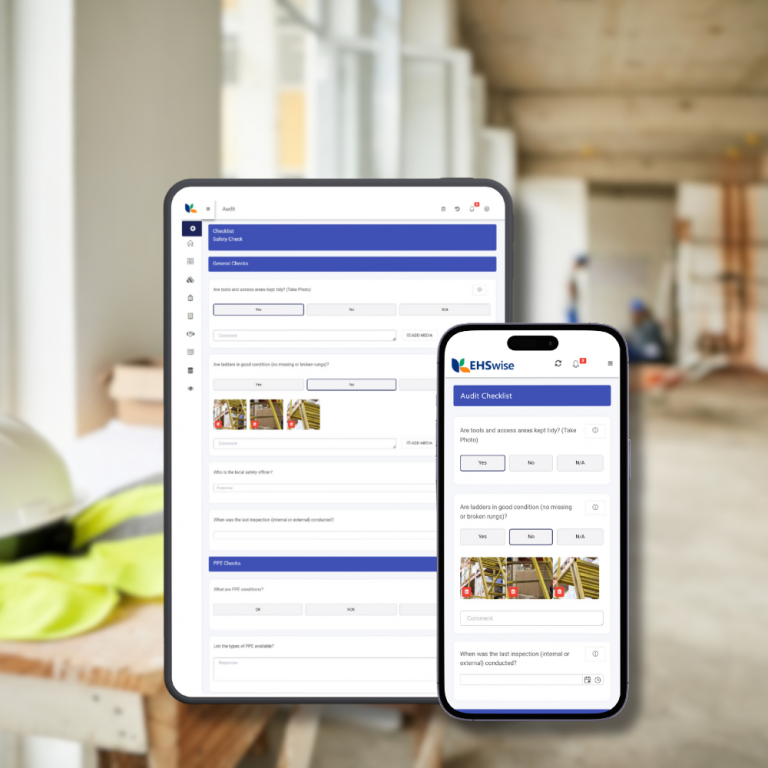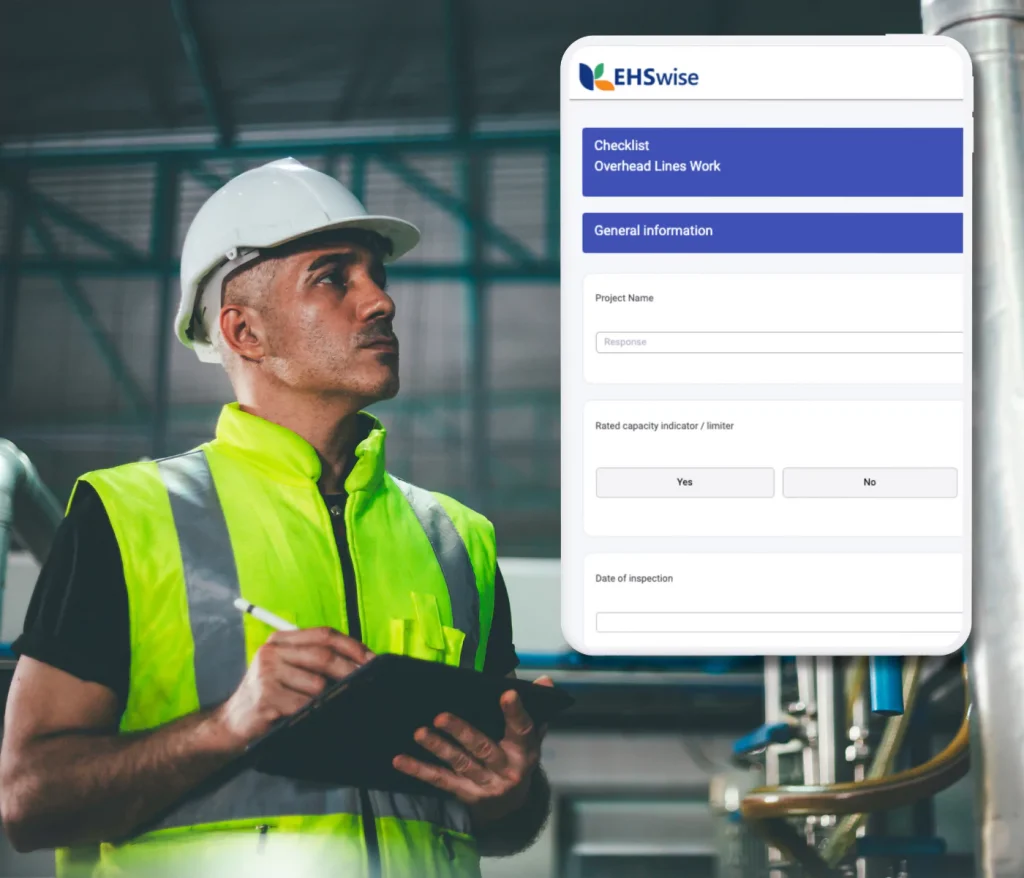Did you know that effective Environmental, Health & Safety software can help you streamline the management of your paper or spreadsheet-based health and safety protocols? We know managing critical safety data manually is time-consuming and prone to errors.
By integrating features such as real-time monitoring, automated reporting, and comprehensive risk assessment tools, Environmental Health & Safety software eliminates these unproductive tasks. It helps improve safety culture by making it easy for everyone to engage and increases operational efficiency by ensuring tasks are managed accurately and quickly.
In addition, this approach can help you ensure safe workplace and eventually lower your downtime and insurance premiums.
Looking at some of the statistics, according to the Occupational Safety and Health Administration (OSHA), there were 5,486 fatal work injuries recorded in the United States in 2022.
On the other hand, according to HSE Health and Safety Executive – regulatory body in the UK: 135 workers were killed in work-related accidents in 2022/23 (RIDDOR).
Therefore, it is crucial for health and safety leaders to implement effective Environmental Health & Safety (EHS) programs to ensure the safety of workers and compliance with regulatory requirements to prevent accidents.
One essential tool for achieving these goals is using a Environmental Health & Safety software.
If you are a safety leader and safety of your workforce and ensuring compliance are important for you keep reading this article. You will learn about key features of Environmental Health & Safety software and how these capabilities can help you better manage health and safety.

What is an Environmental Health & Safety Software?
An Environmental Health & Safety software serves you as a comprehensive digital solution tailored to streamline and enhance your organisation’s health and safety management processes. It consolidates all safety related records into a centralised system. Facilitating efficient monitoring of tasks assigned to your team while providing insights into safety performance.
With Environmental Health & Safety software, you can ensure a proactive approach to maintaining a safe and compliant work environment.
It will also help you comply with regulatory requirements, improve safety management performance, and reduce risks.
By digitising safety management such as incident reporting, risk assessment, audit management, events, observations and more, EHS safety software can help you identify safety hazards, assess risks, and take corrective actions promptly.
Additionally, EHS safety software can help you reduce your environmental impact by managing waste, tracking emissions, and ensuring compliance with environmental regulations.
However, with so many options available in the market, choosing the right EHS software for construction can be overwhelming.
Key features to look for when selecting an Environmental Health & Safety Software:
Incident Reporting:
Environmental Health & Safety software should have a robust incident / accident management feature. This feature enables workers to report incidents, assign corrective actions, and track the progress of each action. The system should also have the ability to generate reports and alerts to ensure prompt action is taken.
With incident management software, workers can easily report incidents through a user-friendly interface whether they are online or offline. And automatically assign tasks and send notifications to the relevant personnel to ensure prompt response.
Inspection Checklists:
Inspection checklists are an essential tool for ensuring compliance with regulatory requirements and maintaining high standards of quality, health and safety in the workplace. By digitising inspections, you can easily report and resolve issues in real-time, even when you are on-the-go.
This enables you to flag problem areas more accurately and reliably, reducing bottlenecks and completing projects faster.
The use of digital inspection checklists also improves accountability by providing a transparent and auditable record of inspection findings and corrective actions taken. By identifying and addressing issues in real-time, you can prevent repeating incidents in the future, saving time and money while improving overall efficiency and productivity.
Read more here to learn how to simplify the management of safety checklists for inspections, audits or other safety functions.

Mobile and Offline Functionality:
Mobile and offline functionality enables workers to access the EHS safety software features on their mobile devices, allowing them to report incidents, complete inspections, and access safety documentation while on the go.
With offline functionality, users can still perform tasks such as filling out checklists, capturing photos, and logging data. These are then automatically synced with the EHS software once internet connectivity is restored.
This ensures that critical EHS data is not lost or delayed due to network connectivity issues.
Document Management:
Environmental Health & Safety software should have a robust document management feature that enables you to store and share safety policy documents securely. Additionally, the software should be able to connect with your existing systems to facilitate more advanced document synchronisation when required.
Furthermore EHS safety software should allow you to generate reports on PDF, Excel or Word to help you manage and share safety related reports and policy documents in a single platform.
Customisation and Scalability:
Health and Safety Management software ensures that organisations comply with safety regulations and standards set by regulatory authorities. The EHS safety software can generate safety-related reports and document safety-related activities, such as inspections, incident reporting, and safety training.
This documentation ensures that you can demonstrate compliance with safety regulations and standards during inspections and audits.
In addition, flexibility that EHS safety software can offer, give you the power to customise software modules to meet your exact requirements, ensuring regulatory compliance.
QR codes for Health and Safety Management:
QR codes can be incredibly useful in enhancing safety management functions in various ways:
- Tracking equipment usage and maintenance
- Streamlining safety inspections
- Providing easy access to training materials
- Offering critical information during emergencies
- Simplifying incident reporting processes
- Offering access to external users (contractors, suppliers)
Overall, QR codes offer a convenient and efficient way to integrate technology into safety management functions, improving communication, compliance, and overall safety culture within an organisation.
Environmental, Health and Safety Software that can provide QR code feature is essential to simplify the overall safety management.
Refining your Environmental Health & Safety software selection process
Refining your Environmental Health & Safety software selection process requires a thoughtful approach.
Start by identifying your unique EHS needs, considering aspects like your organisation’s size, project diversity, hazard profiles, and regulatory obligations.
This insight will guide you in choosing software tailored to your requirements. Additionally, prioritise evaluating the customer support offered by potential vendors.
Confirm they provide comprehensive training, ongoing support, and maintenance services to ensure seamless software operation.

If you’re looking for an EHS safety software solution check out EHSwise – Environmental Health & Safety software and its features.
EHSwise is an intuitive and user-friendly software that offers a range of modules, including Risk Assessment, Inspection checklists, Observation, Audit Management, Corrective action plan, and more, to help you manage your EHS program effectively.
Its mobile and offline functionality also enables users to access critical safety information and functions from anywhere, at any time.
Take your Health and Safety management to the next level with Environmental, Health & Safety Software EHSwise – contact us to learn how.



Pingback: How EHSQ systems can increase site safety in Construction and Manufacturing - Kianda
Pingback: Key Features for Environmental Health and Safety Software - The CIF Health and Safety Summit
Pingback: How EHSQ systems can increase site safety in Construction and Manufacturing - The CIF Health and Safety Summit